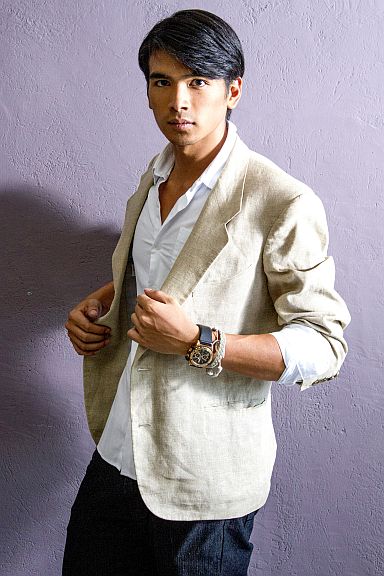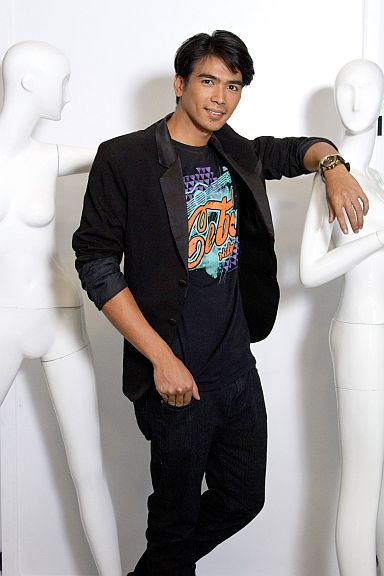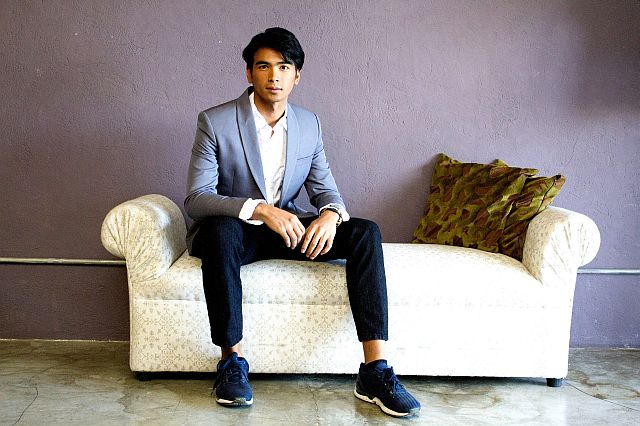
Santino Osmeña,
Amidst electoral matters and political humdrum in Cebu, an Osmeña talking passionately about music and arts can be a breath of fresh air.
Santino Osmeña, grandson of former Cebu governor Emilio “Lito” Osmeña, is an audio engineer from SAE Institute in Berlin, Germany.
Contrary to what many people thought, the life he led in a foreign country was not paved with roses. He studied diligently and had standards to meet.
The struggle of adapting to a new environment was as real as the people he had to get along with. It was Santino’s love for music that kept him going.
This Filipino abroad, not for a second, lost his identity despite the pressure.
If anything, it gave him a new perspective in life.
While Santino has no plans of running for office he admits that his last name comes with political expectations from the people.
The 21-year-old sound master is back in Cebu and is also a recent addition to A.D. Models Philippines. But this young gentleman is more than just fine looks.
Standing 6 feet tall, Santino has principles just as high. His stance on the privilege of having to study or work abroad must be extended to the
people back home.
The invaluable learnings and experience one has gained are meant to be shared to his countrymen. (PHOTOS BY Edd Buenaviaje)
Special thanks:
Canvas Bar Bistro and Restaurant
One Paseo Maria Luisa Road Banilad, Cebu City
Fashion by Dexter Alazas
What you do as a sound engineer?
Artists usually are the ones writing the music. Sometimes the producer writes the music and gives it to the artist, and the artist will perform it.
The audio engineer can do many things. We can do recordings. We’re taught how to use all types of microphones, how each works. What microphone is best for which instrument; which microphone should be used for live; which should be used for the studio. We learn about signal flow. It’s more of the scientific side of music.
That’s why I thought it was perfect to mix it with the arts. I learned a lot of instruments when I was younger. And I used to sing long time ago (Laughs). I wanted to know how to make people sound good, which is basically what our job is. We learned all the different ways to work around problems with music.
What’s the biggest challenge you usually face?
Oh, there are so many! You can have technical problems in the studio. You can even have a problem with the artist. (Laughs).
How do you work on a client’s style without losing yours?
If somebody is hiring me to do their music, instead of trying to create my own style from their music, I try to enhance their music with my own experience.
And how do you tell off difficult clients?
I’m pretty new in industry so I don’t get to say, “I know this better than you so you should listen to me”. I just say, “How badly do you want your song?” or “How much do you want to express yourself?” or “How do you want people to see you in your music?”
If you do a song, you can’t do it half-heartedly because this is going to be you. I’m taking a picture of you with the microphone. This is your image in audio. This is going to be your personality. That’s all I tell them and usually that’s enough.
What made you decide to study audio engineering?
I wanted to take up film first and applied in a lot of universities. I was supposed to go to Beijing Film Academy but I changed my mind. I was choosing between London and Berlin, and then I chose Berlin because I learned German already in school and it’d be such a waste if I never get to use it. I moved there and got settled in.
They told me the starting date is on September 11 and I waited. On that day I went to school, they said, “Did you get my email?” I said I didn’t get any email. Well, it turns out my course got cancelled because there weren’t enough people.
I was like, “What are my other options? Are there any classes in English?” And they said, “Audio Engineering!” (Laughs).

Santino Osmeña
How did you keep yourself motivated?
I really love music that’s the only thing that keeps me motivated. I don’t need people to know me or get super famous. I just need appreciation for my art, that’s all.
I have different SoundCloud accounts because I don’t want to produce different kinds of music on one SoundCloud. People would be like, “Oh this guy is indecisive with his style.”
What can we find in your playlist?
Nowadays it’s more on chill music, electro funk, glitch hop—which is like a mix of hip-hop and dubstep—and future bass.
What are you working on now?
I’m producing one song, Deep House right now. I started producing Electronic Music with Trance. And then I moved to Big Room House, and then Deep House, then I moved to Organic House, and from there I started doing everything! (Laughs).
When did your love for music begin?
I started producing electronic music back in 2012 but before that, I used to play in a band.
What instruments can you play?
I play guitar, bass, piano, harmonica, and saxophone. I want to take up violin. (Laughs). I’m also learning a little bit of flute now because my brother has been teaching me. I also learned synthesizers —how to make different sounds.
How do you put your artistic touch into the music that you create?
Different instruments produce different sounds so you need to know which frequencies need to be boosted, which needs to be cut. That’s the scientific aspect.
They tell you the science of sounds in general. These are the tools you have, but at the end of the day, how the song sounds depend on the audio
engineer’s ears. There’s no such thing as this is the best way to make music. It’s just what you think sounds good—your own style.
And that’s where the experience comes in. You have to listen to all kinds of music, listen to lots of producers, how they make their music to be able to analyze their music and see how your music could benefit from other people’s music. It’s about finding a way to create your own style.
Tell us about your first few weeks in Berlin.
I moved to Berlin when I was 18. I was the youngest student in school. I didn’t know anybody. Berlin is very street fashion. Somehow I had to make friends. (Laughs).
The first few weeks were kind of lonely but I was still settling in and exploring. It was also kind of fun going around the city and choosing which could be a good hangout spot. (Laughs).
Eventually, I made a small group of friends and another group of friends and then I have different friends around the city! (Laughs).
What did you usually do when you were out?
I used to go to the same bar every day because a friend of mine worked there, and the owner became a friend, too. Eventually, I went to different bars and clubs.
Being an audio engineer, it’s not like we’re required to, but it’s suggested that we go to certain places. Professors would say that we go to this club and listen their sound system so we’ll know what good sounds sound like. Or they would say, “Go to the cinema, watch a movie, sit down on this seat in the third row over here. You’ll get the best sound.” So we just sit there and close our eyes and listen.
One time we were in this big convention in Amsterdam area with this gigantic sound system. When you walk in there, you’d expect people to be spread out and dancing around but we’re all audio engineers. We’re all in one sweet spot, sitting there in a circle tightly packed! (Laughs).
How about your new career as a model here?
I started only a year ago. My knowledge in modelling is what I’m being taught about as I go along. It’s the same idea in audio engineering. If you’re an artist and you don’t know a certain aspect of what you’re doing, listen to the people who are hiring you. Don’t act like a diva. Do it to the best of your ability. Get the job done.
Does this have to do with staying fit?
People who are into singing are trained not just to look good, but also to perform well. That’s what motivated me to stay fit. It has nothing to do with my social life.
I went on a daily run back in Berlin, initially for least 10 kilometers. Then I raised the bar and ran with two
kilos on my back, and then five kilos, then 10 kilos.
Speaking of running… do you get asked about politics, specifically on running for public office, given that your last name is Osmeña?
My dad was never into politics. He’s a physicist. He took up physics in his university and got his master’s in business. My dad never ran. It’s business for my dad because he has to take care of four kids. My grandpa was a politician… the other side of the family, I guess.
I don’t get a lot of political questions, but political expectations, yes. People are like, “Hey! You’re going to run one day.” I’m like, “No.” (Laughs).
Is there no pressure from your family?
None. My family gives me support in everything that I want to do, even if it’s not exactly what they want me to do.
But what would make you run for a government position?
If it’s the only option, like if I’m living in Cebu and everything is falling apart, and I couldn’t take it. Otherwise, no, never.

Santino Osmeña
If you had stayed in Cebu, who would Santino Osmeña be now?
I’d probably be listening to the same music as everybody else, have friends and do what they’re doing here. I’d probably be in (University of) San Carlos or Bigfoot (Studios). I’m usually a very lazy person but when I moved to Berlin, I changed. I had to adapt.
In what ways did the experience change you?
I always thought that the important thing was to finish your course, make money and take care of your family. And then I heard people say, “You don’t need money to be happy, dude”.
I met people who walked from Spain to Berlin barefoot. I know people who are in their late 50s and still don’t know what they wanted to do with their lives so they bought a bicycle to bike around Germany and find a place where they want to live. That changed me—I found out that there’s more to what I’ve been experiencing.

